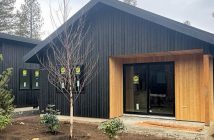A motor racing industry manufacturing veteran is repositioning his Central Oregon based company to stay on track in a fast-moving and competitive field.
Steve Russell, who previously ran reinforced fuel cell specialists FuelSafe for two decades before selling the company in 2004, acquired well-known racing safety gear company Pyrotect in 2006 as another engine for potential growth.
Established in 1972, Pyrotect had developed a reputation for pioneering quality, comfort and style with a complete line of safety equipment for racers, race crews and track safety personnel.
Known for innovative advances in auto racing safety, it makes a range of products, including helmets, fire suits, gloves, shoes, protective wear, safety gear and restraints.
Russell said: “The previous owner had decided to sell due to health issues, but wanted to transfer to someone who had the knowledge and ability within the industry to steer the company into the future.
“I was looking for a similar opportunity at the time so it turned out to be a
good match.
“Gradually, we have reorganized processes including how the manufacturing is handled and tried to refine a well-established market brand known for leading design and safety innovation.”
Part of that reorganization included moving the base of operations from California to Central Oregon; originally to a 10,000 square foot space in Prineville before Russell took advantage of historically competitive rental rates and switched to a building almost twice the size off Bend’s Bridgeford Boulevard earlier this year, to allow for further potential growth. His father, Bill, is also involved in the day-to-day operations of the company.
Russell – who moved to Central Oregon in 1997 – has been around auto racing most of his life, starting out helping his father in FuelSafe’s operations while at high school in Huntington Beach, CA, and also developing a talent for desert racing at the age of around 16.
That pursuit involved racing in specialized suspension off-road vehicles around looping courses, covering up to 40 miles, often laid out over a long and harsh track through relatively barren terrain.
Point to point style races, including the famous Baja 1000 – the flagship event of off-road sanctioning body SCORE International – attract nationally-ranked and celebrity drivers in a test of the endurance and capabilities of racer and machine.
Russell recalled: “I remembered actually having a pair of Pyrotect racing shoes back in those days.
“The company has always had a good niche, but needed to be refocused after having a series of different owners.
“We have streamlined operations and much of the manufacturing had to be switched overseas, using our specifications, to remain competitive with the rest of the industry.
“We also continue to come up with new design innovations and sell our products through an international dealer and distribution network, primarily into the road, rally and dirt racing markets.
“We do custom work, including a recent line for Google employees getting track time, and racing schools, but don’t go into the NASCAR arena.
“The bulk of our activity involves the amateur grass roots dirt track racer, whether that is in the Indycar or local off-road SCORE, SECA, or NHRA/drag racing event such as Madras Speedway. We really mainly cater to the everyday racers – the weekend ‘ordinary Joes’.”
In the same vein, Russell said business has been boosted recently by grass roots racing seeing something of a return to an earlier fast and fun era, with the advent of movements like the “Chump Car” and “24 Hours of LeMons” series of endurance races held on paved road race courses across the US.
The latter title is a parody of the historic European-based 24 Hours of Le Mans series. Teams compete in race-prepared cars that cost no more than $500 (i.e., ‘lemons’) for up to 24 hours. These races set themselves apart from the typical road race by the ‘unusual’ penalties and punishments meted out by judges.
The event is billed as a 24 hour endurance race but typically covers a weekend and multiple participants enduring a number of qualifiers along with the main endurance race of varying total hours, depending on the venue.
Russell said Pyrotect clothing includes single to multiple layers of the fabric known as Nomex – a fire retardant material developed by Dupont – as well as higher end combinations utilizing carbon and Kevlar, which is synonymous with bullet proof vests.
Most racing apparel is certified, with testing and approval carried out by the SFI Foundation – a non-profit organization established to issue and administer standards for specialty/performance automotive and racing equipment.
Helmets also have to be tested through regulatory organizations, including the Snell Memorial Foundation.
Pete Snell was an amateur auto racer who died in a 1956 accident when his then “state-of-the-art” helmet failed to protect him. In his memory, a number of his friends, colleagues and fellow racers, including Dr. George Snively, formed the Snell Memorial Foundation to try to improve helmet design and capabilities, and to encourage the development and use of truly protective helmets.
Today, Snell is known for its ongoing work in setting, maintaining and continually upgrading the most authoritative helmet standards in the U.S. and throughout the world.
Russell said helmets have to be re-certified every 5 years and was proud to say that Pyrotect was one of the few companies that have already met both SFI and Snell 2010 testing requirements for its range of products.
Newer Pyrotect innovations include an aerodynamic helmet design geared towards open cockpit racing, which features vehicles such as smaller formula cars and go-karts, and a patented removable, washable liner incorporating grooves to optimize air circulation.
Pyrotect is recognized as a leader in auto racing helmets, with its innovative PRO Airflow system in full face models designed to keep the driver cool and reduce visor fogging. Fresh air is brought in through a stainless steel air screen and released through rear exhaust vents.
Russell added: “Pyrotect has been around a long time, but after having a number of different owners over the years it was lacking some consistency.
“We have been reorganizing and stabilizing, and looking to somewhat rebrand the company while staying true to its core qualities.
“Our sales have remained steady, though projections have been affected by the recent economic downturn, and we have maintained our position in the industry while continuing to develop new products.”
Pyrotect also maintains a profile regarding showcasing the range of products it offers by attending trade shows such as that sponsored by NASCAR driver Tony Stewart in Indianapolis, and the Performance Racing Industry annual event in Orlando, Florida.
Russell added: “The company has lots of potential. We have survived the economic headwinds of the last three years and are well positioned for future growth.
“Our recent expansion underlines that we are committed to Central Oregon for the long haul and we have been able to move and reorganize early to adapt to market changes and stay ahead of the curve in a more lean and focused position.”
www.pyrotect.com




